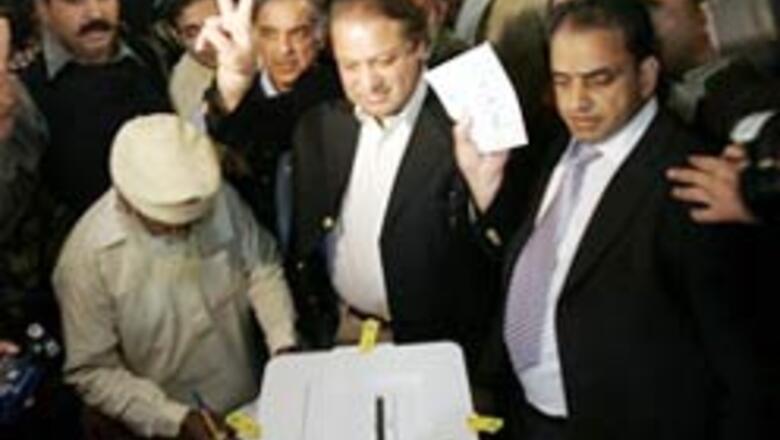
views
Had the Pakistan election been held some eight weeks back when Benazir Bhutto was alive, the poll outcome would have been somewhat predictable.
For, Benazir had emerged the biggest leader in the runup to the election and Pakistan People's Party was far ahead in the surveys. The party had the strongest organisation too.
But her death, the spate of violence that followed and the subsequent political realignment have changed the political climate completely. Today as the nation votes, none of the parties really stands as a clear frontrunner.
In fact, the situation has changed so drastically that erstwhile arch-enemies PPP and PML-N are now exploring ways to form a unity government. For, that seems the only viable option at the moment considering that the election, in all probability, is going to throw up a hung House.
The PPP, though, hopes to emerge as the single largest party, riding on a wave of sympathy votes, after the assassination of Bhutto.
Nawaz Sharif's PML-N is seen to be trailing PPP nationwide. The pro-Musharraf PML-Q, that split from Nawaz Sharif, is not doing well in poll surveys and is likely to finish third.
Also, smaller parties are likely to play key roles in case a coalition era dawns in the country after the polls.
In the 2002 elections to the National Assembly, the pro-Musharraf PML(Q) — which headed the ruling coalition (also called the King's Party) — had won 118 seats out of the total 342 seats.
Late Benazir Bhutto's PPP won 80 seats and Maulana Fazlur Rehman's MMA bagged 59 seats. Nawaz Sharif's PML(N) had finished with just 18 seats while others won 67 seats.
In a recent survey of Pakistan public opinion, conducted by International Republican Institute (IRI) from January 19 to 29, the PPP topped the field garnering 50 per cent in the national sample of over 3,400 respondents while PML-N was second with 22 per cent and PML-Q came in third with only 14 per cent
PAGE_BREAK
As many as 79 per cent of those surveyed feel the elections will have been rigged if PML(Q) wins most seats while 75 per cent of those surveyed said they want Pervez Musharraf's resignation.
According to a political analyst for Pakistan's prominent newspaper Dawn, Punjab holds the key to Musharraf's future. If PML-Q manages to wrest at least 100 out of the 148 National Assembly seats in Punjab and another 30 from the rest of the three provinces, pro-Musharraf groups like MQM, JUI-F are likely to join hands with PML-Q and along with some Independents, they stand a fair chance to form the next government.
Others, however, say the ground realities are very different and the pro-Musharraf parties don't really stand a chance.
Political pundits see another opportunity for PML-Q even if it fails to win a majority. In such a situation, the party might decide to cobble up a ragtag coalition of smaller parties or even try to rope in the PPP.
While PPP continues to talk tough about Musharraf, it might come to a compromise if it's given a lead role in such a dispensation.
On the anti-Musharraf side, one possibility is that the PPP and PML-N might win sizeable number of seats and then join hands to form a coalition government. They may also get some help from Independents and PML-Q turncoats to manage a two-thirds majority in the National Assembly.
But for such a situation, PPP and PML-N need to win a landslide in Sindh and Punjab and bag good number of seats in the NWFP and Balochistan.
This could be a nightmarish scenario for President Musharraf, especially if the PML-N has the crucial number to push forward a radical agenda on the issue of the judiciary.
If PML-Q is routed in the polls, as it is widely speculated, there is also a possibility of PML-N, PPP and a number of like-minded smaller parties forming a national government.
But, political analysts point out, such a government may be very weak and unstable and may not really be able to challenge the might of Pervez Musharraf.


















Comments
0 comment